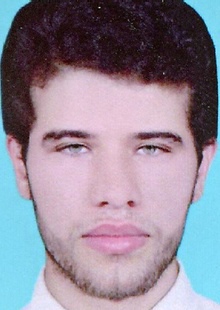
When literacy is used to advocate for change within a society, it poses a threat to those in power, even if those in power tend to overlook it.
With low literacy rates in many Middle Eastern countries, poets often stand out to authorities in the region that has a rich, but often dark history of challenging conventional thought.
Using poetry as a form of protest against an oppressive government is risky, especially if a poet chooses to do so in public demonstrations. The risks, however, haven’t outweighed the benefits for some poets, resulting in high-profile arrests throughout the Middle East in recent years.
As long as there are wrongs carried out by governments, there will always be poets producing work to challenge their decisions.
Ziba Karbassi
Ziba Karbassi, an Iranian poet, has been living in exile in London since 1989. She was only 15 when her mother decided to flee Iran, fearing for her life after her husband was killed, she told MintPress News on Monday.
She was a member of Poets Against the War, a 13,000-strong association of worldwide poets founded in 2003 to protest the Bush administration’s decision to invade Iraq. It’s no surprise, then, that she is known as an activist poet whose work speaks out against violence and war.
“Show me one poet who likes war, killing (or) blood,” Karbassi wrote. “Our fight is only on paper, but our words lighten the way.”
She said that poets have come under increasing attack, as events like the Arab Spring have made it easier for authoritarian regimes to crush dissent, especially if it comes from the pen of a poet.
Her poetry, which was published outside Iran after her mother fled with her to England, has been censored and banned in her home country.
“My life was threatened many times,” she claimed.
As far as modern controversial Iranian poets go, she was lucky.
Arab-Iranian poet Hashem Shaabani was executed in Iran in January after being found guilty of waging a “war against God” and threatening national security, according to human rights groups, The Guardian reported.
Activists, however, say he was simply a member of a cultural institute called Al-Hiwar, or “Dialogue,” dedicated to promoting Arabic art and literature.
Iran has reportedly started stepping up its clampdown on the country’s Arab minority, “arresting activists and handing down heavy sentences often in closed-door courts,” according to The Guardian.
Mohamed Rashid
In October, Qatar’s highest court upheld a 15-year prison sentence for poet Mohamed Rashid al-Ajami. According to Amnesty International, activists in the Gulf region told the human rights group that he was sentenced because of “The Jasmine Poem.” He wrote the poem in 2011, when the Arab Spring began in Tunisia and carried through the region.
Amnesty said the poem was critical of the government and read, in part, “We are all Tunisia in the face of the repressive elite,” which proved enough for the Qatari monarchy to impose an original sentence of life in prison.
Ayat al-Gormezi
In Bahrain, Ayat al-Gormezi, a poet and student, was arrested in March 2011 after she read one of her poems at a demonstration in Manama, the Bahraini capital, during the Arab Spring.
Al-Gormezi was held for several months in jail after she was “forced to turn herself in when masked policemen threatened to kill her brothers unless she did so,” according to The Independent. “Many (women) are held incommunicado, forced to sign confessions or threatened with rape, according to Bahraini human rights groups.”
Originally sentenced to a year in prison in June 2011 in a military trial, she was released the following month due to massive pressure from human rights organizations, according to the Bahrain Center for Human Rights (BCHR).
Maryam al-Khawaja, the interim head for BCHR, told MintPress that al-Gormezi is not currently imprisoned, “but new charges have been brought against her.”
Ahmed Fouad Negm
Egyptian poet Ahmed Fouad Negm spent years in jail after agitating President Gamal Abdel Nasser with a critical composition following Egypt’s resounding defeat in the Six-Day War with Israel in 1967, according to Negm’s December obituary in The New York Times.
He was later released by President Anwar el-Sadat, though Sadat jailed him again after Negm made fun of his speaking mannerisms.
“(Negm’s) words echoed across Tahrir Square in Cairo during the 2011 uprising against President Hosni Mubarak ‘as if they were specifically written for that moment,” a friend said of the poet, the Times reported. “Lines from his poem ‘Who Are They, and Who Are We?’ became a chanted slogan in the square, marking Egypt’s perennial struggles and sharpening the lines of the battle at hand.”
Ken Saro-Wiwa
Poets in the Middle East aren’t the only ones writing despite the consequences. Africa has been a hotbed for crushing dissent for decades.
One notable Nigerian poet who was executed in 1995 was Ken Saro-Wiwa, a leading environmentalist and author. He was killed by Nigeria’s former military regime at the time, according to The New York Times.
A member of the Ogoni ethnic group, “he went on to help found the Movement for the Survival of the Ogoni People, grew to become the largest political organization in the 350-square-mile homeland of the Ogoni. This ethnic group, to which he belonged, includes 500,000 people who live in the oil-rich but desperately poor swamplands of Delta State,” the Times reported.
In 2009, a trial in federal court in New York examined allegations that oil giant Shell lobbied the aid of the former Nigerian military regime to hush Saro-Wiwa, “in addition to paying soldiers who carried out human rights abuses in the oil-rich but impoverished Niger Delta where it operated,” according to the Times.
Shell strongly denied the charges at the time, but was ultimately found guilty and fined more than $15 million.

